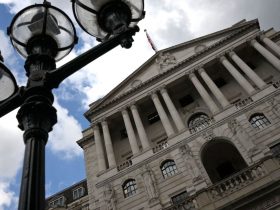The chances of the U.S. falling into recession over the next 12 months has fallen to just 15%, according to Goldman Sachs.
In a new note, Goldman’s chief economist Jan Hatzius also says his baseline forecast for U.S. GDP growth was 2% through to the end of 2024.
The recession chances were lowered from 20% in July, and as high as 35% in March.
The bank’s economics team has long been more optimistic about U.S. growth, with the Bloomberg consensus of peers placing the probability of a contraction at 60% following some recent softer-than-expected data.
And Hatzius accepts there are “fundamental reasons to expect a deceleration in [the fourth quarter], including the resumption of student loan payments and a near-term hit to housing from the recent increase in mortgage rates.”
“But we expect the slowdown to be shallow and short-lived,” he adds.
Hatzius gives two main reasons for this. First, real disposable income looks set to reaccelerate in 2024 on the back of continued solid job growth and rising real wages. Second, he disagrees with the idea the lagging impact of Federal Reserve’s monetary tightening will eventually push the economy toward recession.
“[I]n fact, we think that the drag from monetary policy tightening will continue to diminish before vanishing entirely by early 2024,” he contends.
Indeed, his belief that what is called trimmed mean inflation has fallen to a 2% to 2.5% range in recent months will take pressure off the central bank to raise borrowing costs further. Interest rate cuts of 25 basis points per quarter are likely to start in the second quarter of 2024, says Hatzius.
Addressing last Friday’s mixed nonfarm payrolls report, Hatzius is sanguine about signs of an increase in the jobless rate.
“We are unconcerned about the 0.3 percentage point increase in the unemployment rate to 3.8% in August because it was entirely driven by an increase in labor force participation, the employment/population ratio remained stable at a cycle high, and the first estimate of payroll growth picked up to 187k despite a roughly 50k drag from the Yellow bankruptcy and the Hollywood strike,” he says.
Turning to the stock market, Goldman says that after “climbing the wall of worry for most of 2023”, equities have lost momentum in the last month despite the positive economic news as high valuations and rising bond yields take their toll.
These headwinds could fade “if earnings start to move up more significantly and/or our rates strategists’ forecast of modest declines in long-term yields plays out. That said, our equity strategists’ forecasts imply that the bulk of this year’s soft landing and AI rally has probably been realized at this point,” says Hatzius.
The S&P 500
SPX
has gained 18% this year.
Read the full article here













Leave a Reply